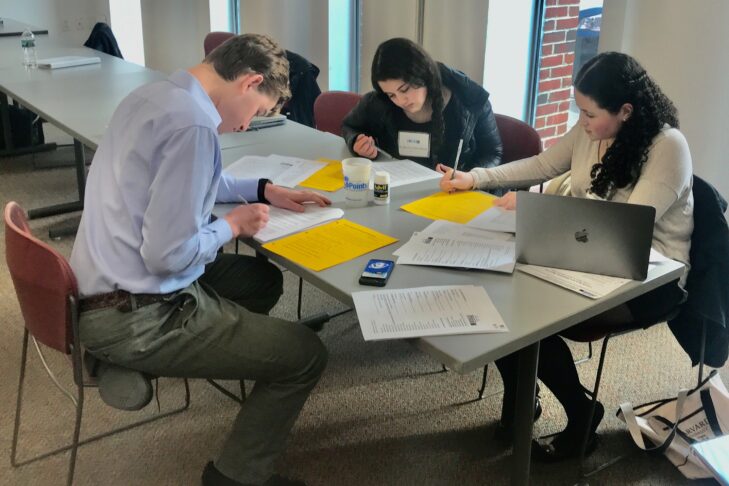Junior year of high school is not for indecisive people. Everywhere you look, there are so many questions and one choice after another that you need to make. What colleges are you thinking about? Where do you think you’re going to go? When and where are you going to tour? What will be your major? What are you doing over the summer? Is it better to sleep or finish this essay? What are you going to do with your life?
But on a completely different note, another question was added to my rushing stream of uncertainty last spring: Which organizations should I donate to?
When I’m not working on my schoolwork or stressing about my future, I am part of the Jewish Teen Foundation of Greater Boston (JTFGB), a Jewish teen philanthropy and leadership program. In JTFGB, we work our way through the grant-making cycle and learn about strategic giving and the ins and outs of the nonprofit world. All the teens are broken up into separate boards, meet every month, pick a social cause to focus on for the year, raise money for that chosen issue area and then give grants to organizations of our choosing. Last year, my board’s issue area was immigration.
After sending out dozens of RFPs (request for proposals) and receiving several grant proposals back from various organizations all across the world, we had to take the time and sift through each one of them with a thoughtful process and evaluation. We’ll toss all of the proposals we really like to the left so we can distinguish those as potential grant recipients later on. We’ll make another pile on the right of all the proposals that really don’t interest us as much. Yep, another decision.
This decision was daunting. Not just because we had to say no to many amazing organizations, but also because I’m not used to having to choose where to donate. Usually friends or family will ask me to donate to a specific organization—meaning the choice of the organization (and issue area) was pretty easy and already made for me (if I wanted to give). This time I had to be the one to choose, and I certainly couldn’t choose all of them.
The RFP process taught me something valuable—something big: a framework for making strategic and thoughtful choices. We chose to evaluate every organization’s grant proposal with four criteria: budget, substance, presentation and alignment with our own mission statement and Jewish values.
Budget. What are they spending their money on? How is their staff being paid? Is there enough money being allocated to overhead? Why are they spending so much money on T-shirts or a meal for one single event? Did they ask for the full amount of money possible in their proposal? Why not?
Substance. What are they actually doing? Did they address all the questions that were asked in the RFP? Is their program or project one we think will be successful or sustainable? Does it add value? What is its impact? Why?
Presentation. Does their story resonate with us? Do we feel connected to the organization and its mission? Does it look professional? Does it capture our attention? Is it proofread? Is it written in a tone that’s understandable for teens?
Alignment. Does the organization actually align with the work we do in JTFGB? Does it reflect our Jewish values of tikkun olam (repairing the world), kehillah (community), tzedek (justice) and others? Does the program work to further our board’s own mission statement? How?
Instead of allowing ourselves to be completely swept away by the poetry of everything involved, we took a big step back. We looked at the organization, its proposal in entirety, and took some time to think. We realized it was actually no longer too overwhelming, that stack of paperwork didn’t seem so high and our decision was not so impossible. We began to acknowledge that while some nonprofits are really great and do meaningful work, they may not necessarily fit in with our mission, and some might even have a particular program that we love but unfortunately aren’t as relevant to our issue area.
Being able to tackle something so big (and also pretty overwhelming) is a really unique and amazing experience—especially for a teenager. It has translated into so many things in my life as I’m constantly answering the other questions that are often consuming my head. I was recently walking around and touring a college campus when I began to let my mind and feet wander with many questions, thoughts and other things that were quickly rushing to my mind. But then I took a minute and forced myself to breathe. I knew to think and evaluate the situation not solely based on my emotions at the time, but rather I should look at the full picture and everything that goes into the decision-making process. I look at classes, faculty, reviews, location and cost.
With all these relevant and important strategies I have learned from JTFGB in my back pocket, a pencil in my hand (or just a laptop) and a well thought-out plan in my head, I am definitely feeling more confident and ready for any big decisions that are thrown my way senior year.
This post has been contributed by a third party. The opinions, facts and any media content are presented solely by the author, and JewishBoston assumes no responsibility for them. Want to add your voice to the conversation? Publish your own post here. MORE


